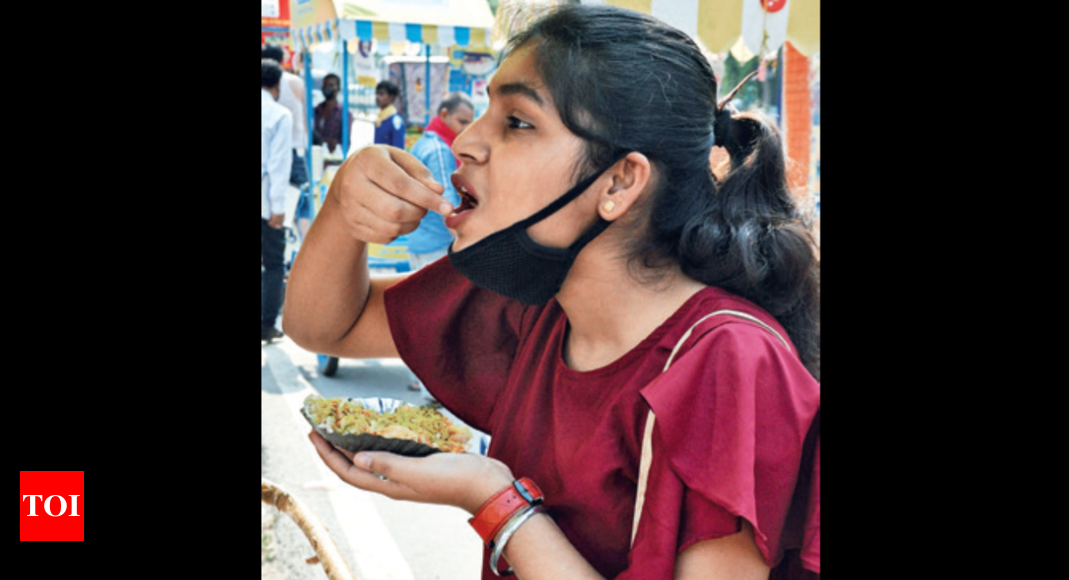


In a tragic incident, a 31-year-old woman from Hyderabad passed away after consuming momos purchased from six individuals running food stalls in the city's Chintal Basti area. The accused, all natives of Bihar, have been arrested on charges of culpable homicide not amounting to murder. The Telangana government, in response to this incident, has banned the production, sale, and storage of mayonnaise made from raw eggs across the state for one year.
Food Poisoning Outbreak Linked to Jalebi and Mayonnaise Consumption Raises Concerns
In a recent incident that has raised concerns about food safety, several individuals have fallen ill after consuming jalebi and mayonnaise in different parts of India.
Jalebi Poisoning in Bihar
In Arrah, Bihar, over 100 people, including children, were hospitalized after consuming jalebi purchased from local street vendors. The victims complained of symptoms such as vomiting, diarrhea, and abdominal pain. Investigations revealed that the jalebi was contaminated with a harmful bacteria, leading to an outbreak of food poisoning.
Momo Poisoning in Hyderabad
In a tragic incident in Hyderabad, a 31-year-old woman passed away after eating momos purchased from food stalls in the city's Chintal Basti area. The accused, six individuals from Bihar, were arrested and charged with culpable homicide not amounting to murder. The investigation found that the momos were contaminated with mayonnaise made from raw eggs, which caused food poisoning.
Telangana Government Ban on Raw Egg Mayonnaise
In response to the Hyderabad incident, the Telangana government has issued a one-year ban on the production, sale, and storage of mayonnaise made from raw eggs across the state. The government has also ordered food safety officials to inspect food establishments and enforce strict hygiene standards.
Top 5 FAQs and Answers
1. What is food poisoning?
Food poisoning is a condition that occurs when harmful bacteria, viruses, or parasites contaminate food. Symptoms can include nausea, vomiting, diarrhea, and abdominal pain.
2. How can I prevent food poisoning?
Wash hands properly before handling food, cook food thoroughly, avoid eating raw or undercooked eggs, and store food at appropriate temperatures.
3. What are the most common causes of food poisoning?
Common causes include bacteria such as Salmonella, E. coli, and Staphylococcus aureus, as well as viruses like norovirus.
4. What should I do if I think I have food poisoning?
Seek medical attention immediately. Stay hydrated by drinking plenty of fluids, and avoid eating until symptoms subside.
5. What are the long-term effects of food poisoning?
In severe cases, food poisoning can lead to dehydration, sepsis, organ failure, and even death. It can also cause long-term health problems such as irritable bowel syndrome (IBS).
Conclusion
The recent outbreaks of food poisoning in India highlight the importance of food safety and the need for consumers to be vigilant about the food they eat. By following proper food handling practices and being aware of the risks, individuals can help prevent the spread of foodborne illnesses.

According to sources, the Special Intensive Revision (SIR) exercise in West Bengal has identified a total of 58,80,202 voters who may be excluded from the draft voter list. This includes people who have passed away, transferred, missing, and identified as 'fake' by the Election Commission. These numbers are subject to change in the final list, which is set to be published on February 14, 2022. The commission has divided voters into three categories - own mapping, progeny mapping, and non-mapping - depending on their presence in the 2002 voter list. Those not falling into any of these categories will be called for a hearing by the EC.

In a significant shift in voter sentiment, the Congress-led United Democratic Front (UDF) is set for a decisive win in the Kerala local body elections, dealing a major setback to the ruling CPM-led Left Democratic Front (LDF) ahead of the 2026 Assembly elections. The UDF has consolidated its gains across urban local bodies, while the LDF's last-minute welfare push failed to curb anti-incumbency. The NDA also made significant gains, underlining its expanding presence in urban Kerala.

In a major upset, the BJP-led NDA has won the Thiruvananthapuram Municipal Corporation, ending the CPI(M)-led LDF's 45-year reign. The victory, with the NDA winning 50 out of 101 seats, is a boost for BJP's aspirations in Kerala's upcoming Assembly elections. The party's strong focus on development and Hindutva in Thiruvananthapuram, under the leadership of state unit president Rajeev Chandrasekhar, proved successful despite challenges faced during the campaigning. This victory has put the BJP in a strong position for the 2021 Assembly elections.

The Bharatiya Janata Party-led National Democratic Alliance (NDA) has taken a huge lead in Thiruvananthapuram Municipal Corporation, giving a setback to the ruling Left Democratic Front (LDF). Initial trends show the NDA leading in 25 wards, while the LDF is ahead in 15 wards and the UDF in 10 wards. This is a major blow to the LDF ahead of the upcoming assembly elections in Kerala, with a record voter turnout of 73.69%. The State Election Commission has also commended the peaceful conduct of the elections.

In the ongoing Kerala local body elections, the NDA, led by the BJP, has made a significant jump by winning or leading on 29 out of 101 wards in the Thiruvananthapuram Municipal Corporation. This is a significant increase from their 2015 performance, where they won only 33 wards. Meanwhile, the LDF, which had a strong hold in the corporation, has faced a setback with only 15 wards in their favor. This shift in dynamics has sparked discussions about the LDF's performance under Chief Minister P Vijayan's leadership.

Indian leaders from across party lines paid homage to the security personnel who lost their lives defending the nation's democratic institution in the 2001 Parliament terror attack. A solemn tribute ceremony was held, with Prime Minister Narendra Modi and Congress leaders Sonia Gandhi and Rahul Gandhi, among others, laying floral wreaths. The President and Prime Minister also paid their respects, while the CRPF paid special tribute to a constable who was posthumously awarded the Ashoka Chakra for her bravery during the attack.

The Supreme Court has put a temporary hold on the Kerala High Court's ruling that 404.76-acre Munambam land is not Waqf property. This came after a Special Leave Petition was filed by the Kerala Waqf Samrakshana Vedhi, which contested the High Court's verdict. The Court clarified that despite the stay, the State Government was right in appointing a one-member Judicial Commission to probe the history and nature of the land. Local residents, however, have opposed the petition and argued for their right to the land.

The Andhra Pradesh State Cabinet, chaired by Chief Minister N Chandrababu Naidu, approved a wide range of proposals in the fields of urban development, industries, energy, tourism, infrastructure, and welfare. These decisions are expected to attract an investment of over Rs 25,000 crore and create more than 1.1 lakh jobs. The Cabinet also approved a 3.64% hike in DA/DR for government employees and pensioners, and other initiatives such as the reconstruction of check-dams and the upgradation of teachers in tribal welfare schools.

The Supreme Court has granted a stay on the Kerala High Court's finding that the Munambam land in Ernakulam district is not waqf property. The Court also ordered that the current status quo of the land be maintained until the next date of hearing. Although the High Court's declaration will remain stayed, the inquiry commission headed by former judge Justice CN Ramachandran Nair can continue to function. The case involves a dispute over 135 acres of land that was originally gifted to Farook College, now facing protests and challenges from the local residents.

The passing of former Union Home Minister and Congress heavyweight Shivraj Patil has left a void in the political landscape of Maharashtra. His tenure in the Ministry of Home Affairs was marked by several contentious moments, including controversies over his response to terror attacks and criticism over his attire during a national security crisis. His resignation after the 26/11 attacks in Mumbai had a lasting impact on his reputation, as leaked US diplomatic cables described him as "spectacularly inept". Despite this, Patil is being fondly remembered by Congress leaders for his dedication to public service and contributions to the nation's democratic institutions.